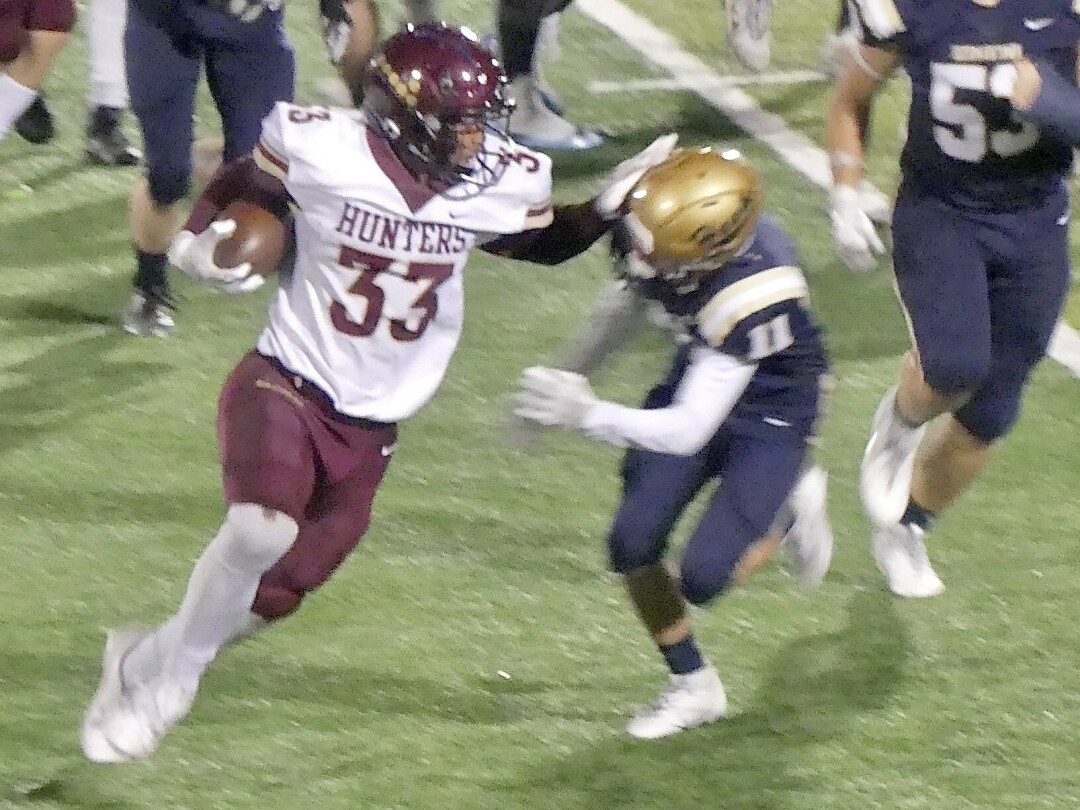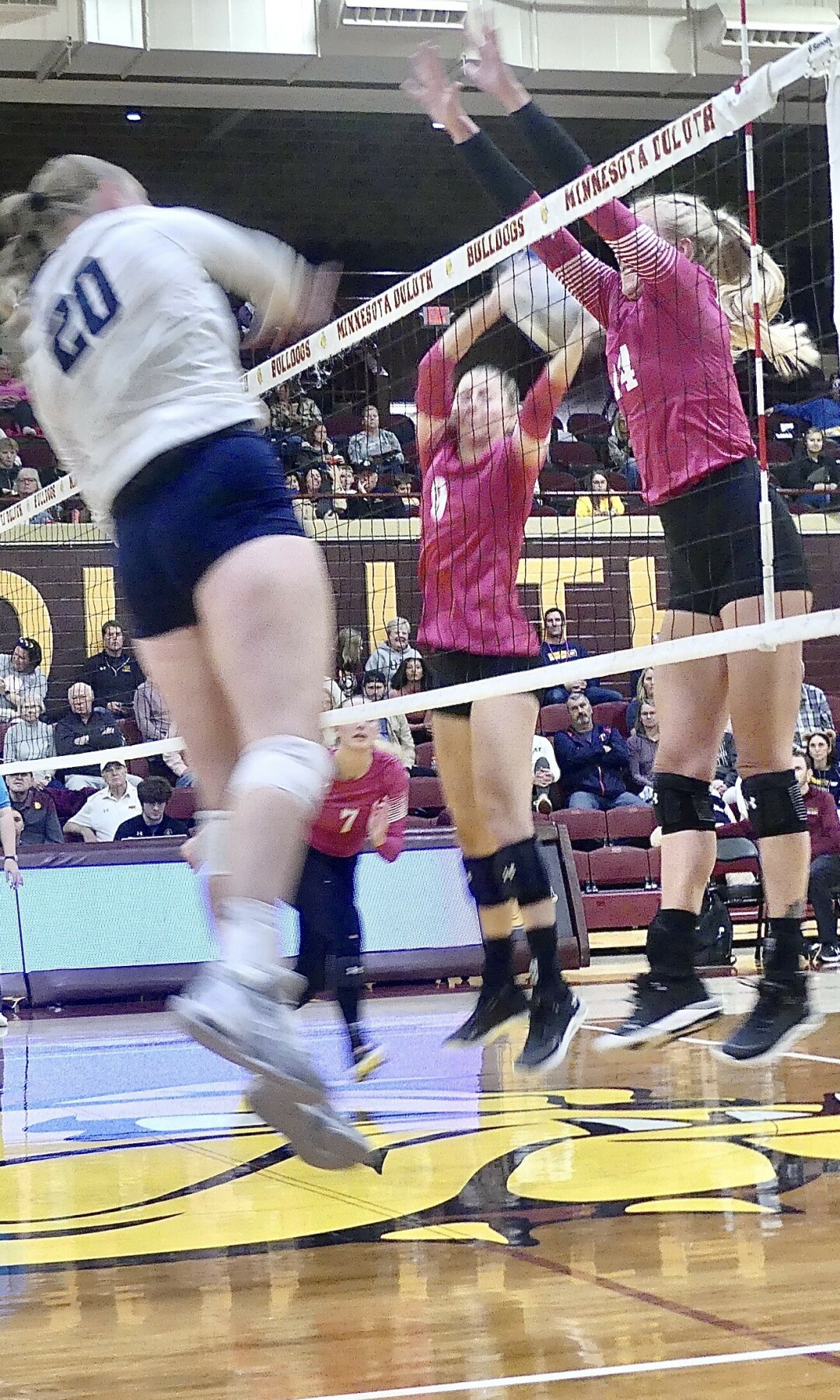Strikeouts ruin hope for ducking analytics

UMD's Zach Stejskal stopped Bemidji State's Lleyton Roed Friday night during a 4-0 victory that was Stejskal's first college shutout. Photos by John Gilbert.
My love for baseball goes back to when I played the game in high school, and then played and coached the game for kids as well as adults for some 50 years. When you do that, you develop some ideas of how to play the game, and I was forceful in pushing those tendencies.
One key one was trying to get every player to be aggressive batting, and to be successful and enjoy doing that. I used to tell 10-year-olds that they never had to worry about hearing me criticize them for striking out, as long as they went after the pitch that got them.
“You never know how far you can hit a head-high pitch until you hit one,” I’d say, “but if you take a called third strike, we’ll talk.” Then I’d throw batting practice and ask them all to swing at every pitch so they would become comfortably aggressive at bat. The same insistence prevailed with each time up: You swing as hard as you want at strikes one and two, but once you have two strikes you must be smart enough to shorten your swing, maybe inch forward in the batting box, and try to protect the plate by hitting the next strike to the opposite field.
My motto to those kids — and later to my men’s amateur 35-and-over players was: If the pitch is close enough for a marginally competent umpire to make a bad called strike three on, swing at it. We won a lot of games with those rules, and we won several championships, and we never did it by going to the plate with trying to coax a walk as our primary objective.
So I have spent considerable time enjoying the Major League playoffs, which are always the best, most exciting baseball of the season. And I especially enjoy watching the Houston Astros, because Dusty Baker has a lot of the same hunches as I do, and follows them. That means you trust your baseball knowledge, and you despise the current trend toward analytics — which are the opposite of baseball’s human instincts.
Do you think anyone goes up to Jose Altuve and tells him that he’s got to take two strikes? No way.
Then we have the Twins. An exciting and successful season by most counts, but an incredibly distasteful dependency on analytics that have soured me on a lot of their achievements.
For example, let’s look at the last of the ninth inning in Game 4 of their best-of-five series against Houston. Baker sent in Ryan Pressly, the one-time Twins pitcher now the star closer for the Astros, and the Twins’ last chance sent up Jorge Polanco, Royce Lewis and Max Kepler. Polanco struck out when he swung and foul-tipped one to the catcher; Lewis swung and struck out; Kepler — who had carried the team’s offense the last two months — was called out on a 3-and-2 pitch that was about two inches outside.
It was, I reminded myself, close enough for a marginally competent umpire to call a strike. That ended it. The Twins, this season, followed the analytically induced rules of manager Rocco Baldelli and the management operation that strikeouts don’t matter as long as you get men on base and hit a few home runs.
The Twins struck out 1,654 times this season — 413 more times than the Astros did. The Twins braintrust said they have no intention of cutting down strikeouts because they want to create runs by hitting the ball hard. Think along with me, now, and tell me in exactly how many of those 1,654 strikeouts did they hit the ball hard or put a runner on base or advance a runner. None. As in, zero.
While the Astros and Texas Rangers decided the American League entry into the World Series, my picks of the Atlanta Braves and Los Angeles Dodgers were left in the dust by the streaking Philadelphia Phillies and the wonderfully unexpected success of the improvisational Arizona Diamondbacks. Should be a great World Series, and here’s hoping the old-school hunches beat the analytical technicians.

Junior Troy Manns used a stiff arm on Hermantown's Bode Madill as he charged around end for a big Denfeld gain, Manns scored two touchdowns and Denfeld won a 31-29 thriller.
Football playoffs take over in all classes this week in high schools, the most exciting time of the year for football fans and players at the grassroots level. I have been enthralled all season by the Denfeld Hunters, and I wrote about them having “the most exciting running backs this side of Esko.” They are in different classes, and both could make runs at the state tournament.
For Esko, it will be a familiar run of an exceptional generation of athletes trying to make a return trip; for Denfeld, this is uncharted territory, but the Hunters earned a bye with a scintillating 31-29 victory at Hermantown last week in their final regular-season game.
Rallying behind superb junior halfback Taye Manns and the lightning-quick identical twins Dashawn and Daquan Moore, quarterback Mace Brooks only completed two passes against the Hawks, a desperation sideline throw to Kaden Dixon on a fourth-down and long play in the fourth quarter, at the Hermantown 1, then connected with Dashawn Moore for a 1-yard TD. Moore and Manns each scored two touchdowns, but the Hunters didn’t put the game away until they had to punt in the final minute. Hermantown quarterback Alex Schott passed the Hawks at midfield, but, after three tries had failed, he dropped back for a Hail Mary finale, but was sacked by the swarming Hunters defense for a game-ending sack. UMD ups and downs
The UMD football team went on the road to Minot and hammered the Minot Beavers 42-7 in a romp that should have the Bulldogs loaded and ready to face those other Beavers, from Bemidji State, Saturday at Malosky Stadium. Now 6-1 (7-1 overall), UMD faces also once-beaten Bemidji State, a team that pushed UMD out of the Division II playoff picture last fall, and which has been ranked ahead of the Bulldogs all this season.
While UMD had the chance to rest some injured players and give some new faces a chance at Minot, they will need all guns blazing to subdue Bemidji State, which can take extra incentive knowing that UMD swept their classmates in a hockey series last weekend. The Bulldogs won 4-0 Friday night at AMSOIL Arena in the first shutout of senior goalie Zach Stejskal’s solid career, then had a strange rematch in Bemidji Saturday night, falling behind 2-0, rallying to go right on by for a 4-2 lead, then blowing the 2-goal lead to go into overtime 4-4.
Sophomore Cole Spicer, moved in to center the first line because of a rash of injuries, celebrated the move by breaking in to score after only 27 seconds of the 3-on-3 overtime for a 5-4 UMD victory and a series sweep. UMD stands 3-0-2, with the two ties both shootout victories, and have battled their way undefeated through their first five games.
This weekend, they are on the road to Cornell. The UMD women swept two at Minnesota State Mankato and now play a two-game series at Bemidji State this weekend before taking on Minnesota the following weekend. The UMD women’s soccer team continued its momentum by beating Sioux Falls 2-1 on Myra Moorjani’s goal with three minutes remaining.
The Bulldogs are now 4-0-2 in their last six games, surging to sixth place (5-3-4) with their home schedule completed and trying to hold on above a three-team tie for seventh, with only the top eight making the Northern Sun playoffs. The shocker of the weekend for UMD athletics is that the volleyball team was staggered by a 3-1 loss to MSU Mankato Friday at Romano Gym, then was just plain beaten by powerful No. 2 ranked Concordia in a three-set sweep Saturday, also at home.
The Bulldogs battled to stay close through the first set, right up to 24-24, but fell to Concordia 26-24. UMD caught Concordia for a brief 14-12 lead in the second set, but from then on it seemed as though every UMD point was the signal for Concordia to string together four or five, and the Bulldogs fell 25-20. In the third set, the same trend continued and Concordia won 25-17. “It was a sign of their experience and veteran skill that responded to every one of our attempts to catch up,” said UMD coach Jim Boos. “I thought we played better today than last night [against Mankato], but we haven’t faced this many bumps for a long time.”
For those still interested in the Minnesota Gophers football team, the Gophers won at Iowa in a 12-10 snoozer with four field goals and an incredibly creative call by the officials. The play in question showed Iowa’s explosive punt-return specialist Cooper DeJean back to receive. As the punt from the Minnesota 14 with 1:46 remaining, sailed downfield, DeJean had to run to his left to catch it, and, obviously concerned that a teammate might mess up his plan, DeJean put his left arm straight out, never more than shoulder high, and waved as if shooing everyone away from his territory. He caught the ball on the bounce at the sideline at the 46 yard line, turned toward midfield — and ran 54 yards for the touchdown. That would mean Iowa has still not lost to the Gophers in Iowa City in this century, 1999 being the last time.
The officials, Iowa coach Kirk Ferentz explained to reporters afterward, had told him in the normal pregame meeting that to be a valid fair catch, one arm must be pointed straight up. But in this case, the officials said they reviewed the whole play and that DeJean’s gesture was “an invalid fair catch,” so the play was blown dead at the 46. No touchdown, no Iowa victory, and the Gophers came home from Iowa City with Floyd of Rosedale, the prize 98-pound bronze pig.
The Gopher men’s hockey team needed such a call at Grand Forks, where they won 4-0 Friday night, but lost 2-1 on Saturday. That could have been costly in the polls, but Boston University and Michigan, which were 2 and 3, also both lost, so one college poll kept the Gophers No. 1 this week.

Concordia's Jamie Guptill slammed a shot past the block of UMD's Payton Addink (14) and Hope Schjenken (9). UMD wore pink jerseys to inspire the fight against breast cancer.
